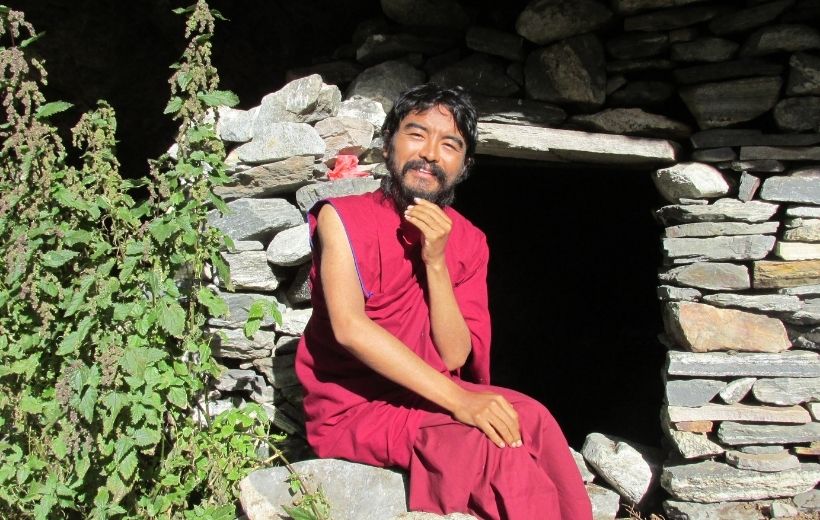BENEFITS OF MEDITATION
Living with Loss
By Yongey Mingyur Rinpoche • 6 min read
In today’s turbulent world, many people are experiencing sudden loss. Many people are losing their financial stability, for example. Often we think of our jobs as a source of stability, and a place where we can engage, and it gives us some sense of warmth and protection. Life is impermanent, but because most of the events that cause us problems and suffering are unanticipated, we don’t want surprises. We grasp at consistency.

Once we begin to connect with the transient nature of life, our minds become more open and flexible. But at the beginning, it just makes us feel insecure.
“Impermanence? What’s the deal with that? It is so depressing.” Certainly, when I began to learn about impermanence, I felt that it was very depressing. But, eventually, I began to embrace it and harness its power.
When I faced a difficult problem, accepting impermanence became my source of support and, in a way, a safe place. And not only that. Appreciating that everything is always changing like waves in the ocean allows me to perceive all the different possibilities and options. Without this view, I would get fixated on one idea only. And then there would be no room for creativity, no way to see new opportunities.
Of course, I have experienced many losses myself. My father was truly wonderful. He was one of the best fathers, in a way. Very kind, always providing me with guidance. I was extremely lucky, because he was not only my parent, but my teacher, too. I often say that all I had to do was be born, and there was both a teacher and a father waiting for me. Buy one, get one free!
But of course, aging is inevitable, and the day came when he died. I was there at the moment of his death, and I stood there in deep shock, thinking, “My spiritual teacher, my father, is gone now.”
But at the same time, I had absorbed his teachings on how to accept impermanence. Impermanence is not only that something is gone, finished; it is also a coming. It is a happening. It is a potential. So I tried hard to work with my feelings of loss and grief. And in doing that, I felt, in a way, more alive than when I had access to my father’s physical presence. His teachings were within me, alive. In practicing them, I no longer felt separated from him.
“When you’re a child, you have specific opportunities; when you grow up, you have other, different prospects and alternatives. When you’re elderly, there are still more particular life experiences to take pleasure in. If you enjoy all these moments, you will feel very content.”
– Mingyur Rinpoche –
It’s thanks to the lessons I received in my childhood that I can do this kind of practice. Sometimes I got them from my grandma. For instance, when I was maybe six years old, she passed by while I was making an elaborate sandcastle.
It was a big temple, with a fancy bridge. Suddenly it collapsed. I cried, “My temple is gone!” And my grandma said, “Oh, that is impermanence. One day you will die, too.” Also, in my childhood I had frequent panic attacks, which were very frightening and painful. They taught me how to let go of my happy, innocent, normal life.
Eventually, when I learned how to live with panic, panic became my friend and teacher. Later, as an adult, I went on a wandering retreat in the mountains. When all my money ran out, and I had to beg for sustenance on the street, I almost died of food poisoning. That was a little bit too much, but I let it go, and did not give up. Actually, I learned a lot from that too.
Some of what happens to us, traditionally referred to as “natural suffering,” can’t really be changed. Take aging, for example. Sorry to tell you the bad news, but we’re all getting older! But when we accept that, it’s okay. In fact, we feel more relieved, happier.
When you’re a child, you have specific opportunities; when you grow up, you have other, different prospects and alternatives. When you’re elderly, there are still more particular life experiences to take pleasure in. If you enjoy all these moments, you will feel very content. But if you get hung up on being young, you won’t see the great variations of possibility that come with the different ages. So we need to accept these natural developments.
Of course, sometimes facing reality is very difficult. I’m not saying that it’s easy when you lose something or someone really dear to you, especially when a loved one dies. I’m not saying that you just have to accept it, and then go on like nothing happened. It’s not like that. It is very painful. I understand that. But at the same time, what is really important is to try to accept it, learn from it, grow from it, and use it as a catalyst for transformation.
So, we agree that there are some things that you can’t change, such as aging. But what we can change is our fear of these things. We can work with that fear, transform it. Therefore, I strongly encourage you to turn these feelings into friends. This is what we sometimes call “alchemy.” According to the old story, through the power of alchemy, iron could be turned into gold. Likewise, our innate qualities of awareness, love and compassion, and wisdom can transform any strong emotions. And they are always within us.
If you enjoyed reading our articles, please join our mailing list and we’ll send you our news and latest pieces.
Learn meditation under the skillful guidance of world-renowned teacher Yongey Mingyur Rinpoche at your own pace.

In his approach to teaching meditation, Mingyur Rinpoche integrates traditional Buddhist practice and philosophy with the current scientific understanding of the mind and mental health – making the practice of meditation relevant and accessible to students around the world. Mingyur Rinpoche is the author of the best-selling book The Joy of Living: Unlocking the Secret and Science of Happiness, as well as Joyful Wisdom: Embracing Change and Finding Freedom, In Love with the World: A Monk’s Journey Through the Bardos of Living and Dying, and many others.

Ten years ago Mingyur Rinpoche returned from his wandering retreat. Hear from the Tergar Instructors about the magical week when Mingyur Rinpoche emerged from his four-and-a-half-year retreat.

“Rinpoche has so beautifully given the essence in such a simple and accessible manner that other masters would hesitate to give until the student has spent maybe twenty years with them.” – Arun Poudel

Drawing on decades of meditation experience, Myoshin Kelley offers practical and heartfelt guidance for anyone wishing to deepen their meditation practice.
If you enjoyed reading our articles, please join our mailing list and we’ll send you our news and latest pieces.